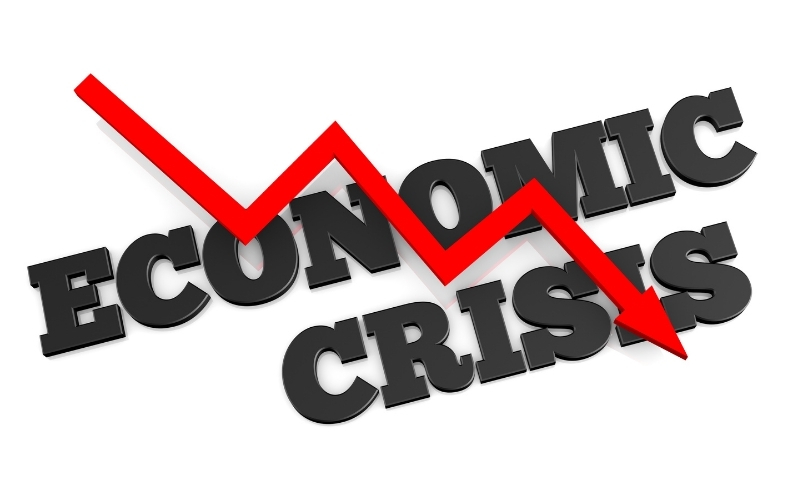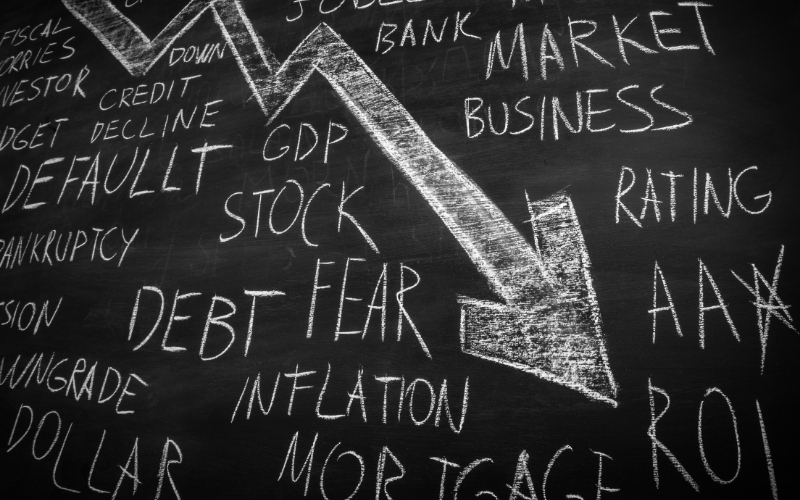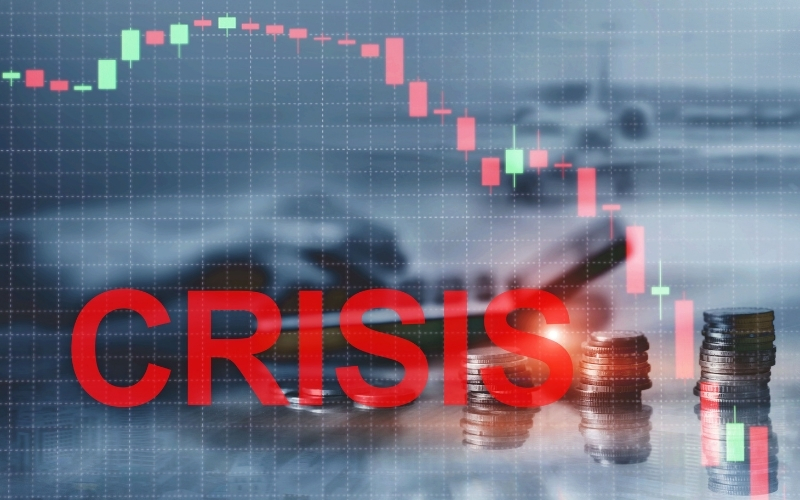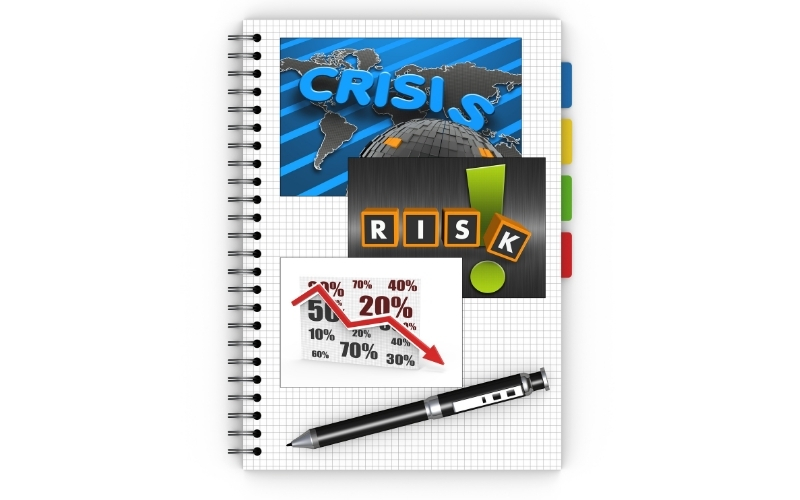
Trọn Bộ Từ Vựng Tiếng Anh Về Khủng Hoảng Kinh Tế Thường Gặp Trong Đề Thi IELTS
Trong bài thi IELTS, việc nắm vững từ vựng về các chủ đề đa dạng là một lợi thế lớn. Một trong những chủ đề thường xuất hiện là khủng hoảng kinh tế. Việc hiểu và sử dụng thành thạo từ vựng tiếng Anh về khủng hoảng kinh tế sẽ giúp bạn tự tin hơn khi đối mặt với các câu hỏi liên quan trong bài thi IELTS, đặc biệt là trong các phần thi Speaking và Writing. Đồng thời, nó cũng giúp bạn mở rộng vốn từ, cải thiện khả năng đọc hiểu và phân tích các bài đọc phức tạp liên quan đến kinh tế. Hãy cùng Marvelish khám phá bộ từ vựng tiếng Anh về khủng hoảng kinh tế để chuẩn bị tốt nhất cho kỳ thi IELTS của bạn trong bài viết sau!
Giới thiệu chung về từ vựng tiếng Anh khủng hoảng kinh tế
Từ vựng tiếng Anh về khủng hoảng kinh tế là những thuật ngữ quan trọng không chỉ trong lĩnh vực kinh tế mà còn trong các kỳ thi quan trọng như IELTS và TOEFL. Đây là các từ ngữ và thuật ngữ mà sinh viên và chuyên gia kinh tế cần nắm vững để hiểu và thảo luận về các vấn đề liên quan đến suy thoái kinh tế, lạm phát, khủng hoảng tài chính và các hiện tượng kinh tế khác.
Khủng hoảng kinh tế tiếng Anh là gì?
Khủng hoảng kinh tế trong tiếng Anh được gọi là “Economic Crisis” hay “Depression”. Đây là thuật ngữ dùng để chỉ những thời kỳ suy thoái nghiêm trọng trong nền kinh tế của một quốc gia hoặc toàn cầu. Một cuộc khủng hoảng kinh tế thường đi kèm với các biểu hiện như giảm sút sản lượng kinh tế, tỷ lệ thất nghiệp cao, giảm giá trị tài sản, sự suy giảm niềm tin của nhà đầu tư và tiêu dùng và nhiều vấn đề tài chính khác.

Khủng hoảng kinh tế có thể xuất phát từ nhiều nguyên nhân, bao gồm bong bóng tài sản bị vỡ, sự sụp đổ của hệ thống ngân hàng, chính sách kinh tế sai lầm, hoặc các sự kiện bất ngờ như thiên tai hoặc đại dịch. Một số ví dụ nổi bật về khủng hoảng kinh tế trong lịch sử là Đại Suy Thoái (Great Depression) vào những năm 1930 và khủng hoảng tài chính toàn cầu năm 2008 (Global Financial Crisis).
Hiểu rõ thuật ngữ này và các yếu tố liên quan sẽ giúp bạn dễ dàng tiếp cận và phân tích các bài đọc và bài viết về chủ đề kinh tế trong bài thi IELTS.
Từ vựng tiếng Anh về khủng hoảng kinh tế là gì?
Từ vựng tiếng Anh về khủng hoảng kinh tế bao gồm các từ và cụm từ mô tả tình trạng suy thoái kinh tế, nguyên nhân, hậu quả và các biện pháp khắc phục. Những từ vựng này không chỉ xuất hiện trong các bài đọc và bài viết về kinh tế mà còn thường được sử dụng trong các cuộc thảo luận và bài thi IELTS.

Nắm vững những từ vựng này sẽ giúp bạn hiểu rõ hơn về các bài viết liên quan đến kinh tế, trả lời tốt hơn các câu hỏi trong phần thi Speaking và Writing của IELTS, cũng như nâng cao khả năng giao tiếp và hiểu biết về các vấn đề kinh tế trong thực tế.
Xem thêm: Từ Vựng Chủ Đề Gender Equality Thường Gặp Trong IELTS Writing Task 2
Tại sao cần học từ vựng tiếng Anh chủ đề khủng hoảng kinh tế?
Học từ vựng tiếng Anh về chủ đề khủng hoảng kinh tế là rất quan trọng và mang lại nhiều lợi ích thiết thực, đặc biệt đối với các thí sinh chuẩn bị cho kỳ thi IELTS. Dưới đây là những lý do chính:
- Mở rộng vốn từ vựng chuyên ngành: Khủng hoảng kinh tế là một chủ đề phổ biến trong các bài đọc và bài viết học thuật. Việc nắm vững từ vựng về chủ đề này giúp bạn mở rộng vốn từ chuyên ngành, từ đó cải thiện khả năng đọc hiểu và phân tích các bài viết liên quan.
- Nâng cao kỹ năng đọc hiểu: Khi gặp phải các bài đọc có nội dung phức tạp về kinh tế, việc biết từ vựng chuyên ngành sẽ giúp bạn dễ dàng hơn trong việc hiểu và phân tích thông tin, từ đó trả lời chính xác các câu hỏi.
- Cải thiện kỹ năng viết: Trong phần thi IELTS Writing, bạn có thể gặp các đề bài yêu cầu thảo luận về các vấn đề kinh tế. Việc sử dụng các từ vựng tiếng Anh về kinh tế một cách chính xác và phong phú sẽ giúp bạn tạo ra những bài viết logic, mạch lạc và thuyết phục hơn.
- Nâng cao kỹ năng nói: Trong phần thi IELTS Speaking, bạn có thể phải thảo luận về các vấn đề kinh tế toàn cầu, chẳng hạn như tác động của khủng hoảng kinh tế đối với xã hội. Việc sử dụng từ vựng phù hợp sẽ giúp bạn diễn đạt ý kiến rõ ràng và chuyên nghiệp hơn.

- Hiểu biết sâu sắc hơn về kinh tế: Nắm vững và hiểu rõ cách sử dụng từ vựng tiếng Anh về chủ đề kinh tế không chỉ giúp bạn trong kỳ thi IELTS mà còn nâng cao kiến thức chung về kinh tế toàn cầu. Điều này rất hữu ích cho những ai có định hướng làm việc trong các lĩnh vực kinh tế, tài chính, kinh doanh hay nghiên cứu.
- Tăng khả năng phân tích và lập luận: Việc học và sử dụng từ vựng về khủng hoảng kinh tế giúp bạn phát triển khả năng phân tích và lập luận về các vấn đề phức tạp. Điều này rất quan trọng trong việc hình thành các ý tưởng sáng tạo và giải quyết vấn đề trong cả học tập và công việc.
- Ứng dụng thực tiễn: Khủng hoảng kinh tế là một vấn đề toàn cầu, ảnh hưởng đến mọi người ở mọi quốc gia. Hiểu biết và sử dụng thành thạo từ vựng về khủng hoảng kinh tế giúp bạn cập nhật thông tin, thảo luận và phân tích các vấn đề kinh tế trong cuộc sống hàng ngày và công việc.
Tóm lại, việc học từ vựng tiếng Anh về khủng hoảng kinh tế không chỉ giúp bạn đạt kết quả tốt hơn trong kỳ thi IELTS mà còn trang bị cho bạn kiến thức và kỹ năng cần thiết để hiểu và tham gia vào các cuộc thảo luận về kinh tế toàn cầu.
Xem thêm: Mới Bắt Đầu Học IELTS Nên Học Kỹ Năng Nào Trước?
Bộ từ vựng tiếng Anh về khủng hoảng kinh tế thông dụng nhất hiện nay
Dưới đây là danh sách các từ vựng tiếng Anh thông dụng nhất liên quan đến khủng hoảng kinh tế. Những từ và cụm từ này thường xuất hiện trong các bài đọc, bài viết và cuộc thảo luận về kinh tế, đặc biệt là trong bối cảnh các cuộc khủng hoảng tài chính và suy thoái kinh tế.
Từ vựngPhiên âmTừ loạiDịch nghĩaVí dụ Recession rɪˈsɛʃən Noun Suy thoái kinh tế The country fell into recession following a financial crisis. Depression dɪˈprɛʃən Noun Đại suy thoái The Great Depression had a profound impact on global economics. Economic downturn ˌiː.kəˈnɒmɪk ˈdaʊntɜːn Noun Suy thoái kinh tế The economic downturn led to a decrease in consumer spending. Financial crisis faɪˈnænʃəl ˈkraɪsɪs Noun Khủng hoảng tài chính The 2008 financial crisis affected economies worldwide. Unemployment ˈʌnɪmˌplɔɪmənt Noun Thất nghiệp High unemployment rates are a consequence of economic crises. Inflation ɪnˈfleɪʃən Noun Lạm phát Hyperinflation can destabilize an economy rapidly. Deflation dɪˈfleɪʃən Noun Giảm phát Deflation can lead to reduced consumer spending. Stagnation stæɡˈneɪʃən Noun Trì trệ kinh tế Economic stagnation can hinder growth and development. Bankruptcy ˈbæŋkrəptsi Noun Phá sản Several businesses faced bankruptcy during the recession. Debt det Noun Nợ The national debt increased during the economic crisis. Bailout ˈbeɪlaʊt Noun Gói cứu trợ Governments provided bailout packages to stabilize banks. Economic bubble ˌiː.kəˈnɒmɪk ˈbʌbl Noun Bong bóng kinh tế The housing market bubble burst during the financial crisis. Stock market crash stɒk ˈmɑːkɪt kræʃ Noun Sụp đổ thị trường chứng khoán The stock market crash of 1929 led to the Great Depression. Fiscal policy ˈfɪskəl ˈpɒləsi Noun Chính sách tài khóa Governments adjust fiscal policy to manage economic challenges. Monetary policy ˈmʌnɪtəri ˈpɒləsi Noun Chính sách tiền tệ Central banks use monetary policy to regulate inflation rates. Interest rate ˈɪntrɪst reɪt Noun Lãi suất Lowering interest rates can stimulate economic growth. Gross Domestic Product (GDP) ɡrəʊs dəˈmɛstɪk ˈprɒdʌkt Noun Tổng sản phẩm quốc nội GDP measures a country’s economic performance annually. Economic stimulus ˌiː.kəˈnɒmɪk ˈstɪmjʊləs Noun Kích thích kinh tế Governments use economic stimulus to boost economic activity. Quantitative easing ˌkwɒntɪteɪtɪv ˈiːzɪŋ Noun Nới lỏng định lượng Quantitative easing aims to increase money supply in the economy. Foreclosure fɔːˈkləʊʒər Noun Tịch thu tài sản Many homes were lost due to foreclosure during the crisis. Poverty ˈpɒvəti Noun Nghèo đói Poverty rates increased as a result of economic hardship. Social unrest ˈsəʊʃəl ʌnˈrɛst Noun Bất ổn xã hội Social unrest often accompanies economic instability. Economic inequality ˌiː.kəˈnɒmɪk ˌɪnɪˈkwɒləti Noun Bất bình đẳng kinh tế Economic inequality is a pressing issue in many societies. Credit crunch ˈkrɛdɪt krʌntʃ Noun Sự suy giảm về tín dụng Businesses struggled to secure loans during the credit crunch. Financial instability faɪˈnænʃəl ˌɪnstəˈbɪləti Noun Sự bất ổn tài chính Financial instability can lead to market volatility. Economic crisis ˌiː.kəˈnɒmɪk ˈkraɪsɪs Noun Khủng hoảng kinh tế The 2008 economic crisis had global repercussions. Job loss ʤɒb lɒs Noun Mất việc làm Job losses were widespread during the economic downturn. Layoffs ˈleɪɒfs Noun Sa thải nhân viên Many employees faced layoffs due to company closures. Economic recovery ˌiː.kəˈnɒmɪk rɪˈkʌvəri Noun Hồi phục kinh tế Economic recovery requires sustainable growth strategies. Trade deficit treɪd ˈdɛfɪsɪt Noun Thiếu hụt thương mại The country struggled with a persistent trade deficit. Government debt ˈɡʌvənmənt det Noun Nợ công Government debt increased as a result of economic stimuli. Economic downturn ˌiː.kəˈnɒmɪk ˈdaʊntɜːn Noun Suy thoái kinh tế The economic downturn affected various sectors of the economy. Taxation ˈtæksˈeɪʃən Noun Thuế Higher taxation was necessary to fund public services. Budget deficit ˈbʌdʒɪt ˈdɛfɪsɪt Noun Thiếu hụt ngân sách The government faced a significant budget deficit. Insolvency ɪnˈsɒlvənsi Noun Vỡ nợ Many businesses faced insolvency during the crisis. Economic impact ˌiː.kəˈnɒmɪk ˈɪmpækt Noun Tác động kinh tế The economic impact of the pandemic was severe. Economic turmoil ˌiː.kəˈnɒmɪk ˈtɜːmɔɪl Noun Biến động kinh tế Economic turmoil can lead to uncertainty in markets. Wage cuts weɪdʒ kʌts Noun Cắt giảm lương Many employees faced wage cuts during the economic crisis. Economic policy ˌiː.kəˈnɒmɪk ˈpɒləsi Noun Chính sách kinh tế Effective economic policies are crucial for recovery. Economic forecast ˌiː.kəˈnɒmɪk ˈfɔːkɑːst Noun Dự báo kinh tế Economic forecasts predicted a slow recovery for the economy. Economic indicator ˌiː.kəˈnɒmɪk ˈɪndɪkeɪtə Noun Chỉ số kinh tế Economic indicators show the health of an economy. Business closure ˈbɪznɪs ˈkləʊʒə Noun Đóng cửa doanh nghiệp Many businesses faced closure due to economic pressures. Economic stagnation ˌiː.kəˈnɒmɪk stæɡˈneɪʃən Noun Trì trệ kinh tế Economic stagnation can lead to long-term economic challenges. Credit rating ˈkrɛdɪt ˈreɪtɪŋ Noun Đánh giá tín dụng Credit ratings impact borrowing costs during economic crises. Economic recovery plan ˌiː.kəˈnɒmɪk rɪˈkʌvəri plæn Noun Kế hoạch phục hồi kinh tế Governments implemented economic recovery plans post-crisis. Economic policy ˌiː.kəˈnɒmɪk ˈpɒləsi Noun Chính sách kinh tế Effective economic policies are crucial for recovery. Economic forecast ˌiː.kəˈnɒmɪk ˈfɔːkɑːst Noun Dự báo kinh tế Economic forecasts predicted a slow recovery for the economy. Economic indicator ˌiː.kəˈnɒmɪk ˈɪndɪkeɪtə Noun Chỉ số kinh tế Economic indicators show the health of an economy. Business closure ˈbɪznɪs ˈkləʊʒə Noun Đóng cửa doanh nghiệp Many businesses faced closure due to economic pressures. National economy ‘næʃənl ɪ’kɑnəmi Noun Kinh tế quốc dân The national economy is experiencing growth. Obtain cash əb’teɪn kæʃ Verb + Noun Rút tiền mặt You can obtain cash from the ATM. Mortgage ‘mɔrɡɪdʒ Noun Hoạt động tiền tệ He took out a mortgage to buy a house. Originator ə’rɪdʒəneɪtər Noun Người khởi đầu Steve Jobs was the originator of Apple. Retailer ‘riːteɪlər Noun Người bán lẻ The retailer sells products to consumers. Non-card instrument ‘nɑn kɑrd ‘ɪnstrəmənt Noun Phương tiện thanh toán không dùng tiền mặt Mobile payment is a non-card instrument. Insurance ɪn’ʃʊrəns Noun Bảo hiểm He bought insurance for his car. Interest ‘ɪntrəst Noun Tiền lãi The bank pays interest on savings. Open cheque ‘oʊpən ʧɛk Noun Séc mở She issued an open cheque to the supplier. Budget surplus ‘bʌdʒɪt ‘sɜːrpləs Noun Thặng dư ngân sách The government achieved a budget surplus. Indicator of economic welfare ‘ɪndɪkeɪtər ʌv ˌiːkə’nɑmɪk ‘wɛlfɛr Noun Chỉ tiêu phúc lợi kinh tế GDP per capita is an indicator of economic welfare. Real national income rɪəl ‘næʃənl ‘ɪnkʌm Noun Thu nhập quốc dân thực tế Real national income accounts for inflation. Managerial skill ‘mænɪdʒɪrɪəl skɪl Noun Kỹ năng quản lý Her managerial skills are impressive. Bailout ‘beɪlaʊt Noun Cứu trợ, giải cứu (kinh tế) The government provided a bailout to the failing bank. Monetary activities ‘mʌnətɛri æk’tɪvətiz Noun Hoạt động tiền tệ Monetary activities affect interest rates. Economic blow ˌiːkə’nɑmɪk bloʊ Noun Giá trị nền kinh tế bị thổi bay The economic blow affected many industries. Financial crisis faɪ’nænʃəl ‘kraɪsɪs Noun Khủng hoảng tài chính The 2008 financial crisis caused global turmoil. Stimulus package ‘stɪmjələs ‘pækɪdʒ Noun Gói kích thích kinh tế The government announced a stimulus package to boost the economy. Potential demand pə’tɛnʃəl dɪ’mænd Noun Nhu cầu tiềm tàng The market analysis identified potential demand. Moderate price ‘mɑdərət praɪs Noun Giá cả phải chăng The store offers products at moderate prices. Global health disaster ‘ɡloʊbəl hɛlθ dɪ’zæstər Noun Thảm họa sức khỏe toàn cầu The pandemic was a global health disaster. Per capita income pər ‘kæpɪtə ‘ɪnkʌm Noun Thu nhập bình quân đầu người Per capita income varies by region. Business slowdown ‘bɪznəs ‘sloʊdəʊn Noun Tốc độ phát triển kinh doanh chậm The business slowdown affected profits. Financial burden faɪ’nænʃəl ‘bɜːrdn Noun Gánh nặng tài chính Student loans can be a financial burden. Global recession ‘ɡloʊbəl rɪ’sɛʃn Noun Suy thoái toàn cầu The global recession impacted employment. Operating cost ‘ɑpəreɪtɪŋ kɔst Noun Chi phí hoạt động They aim to reduce operating costs. Bank bill bæŋk bɪl Noun Hối phiếu ngân hàng The bank bill was due at the end of the month. Remote banking rɪ’moʊt ‘bæŋkɪŋ Noun Dịch vụ ngân hàng từ xa Remote banking allows access from anywhere. Macro-economic ‘mækrəʊ ɪ’kɒnəmɪk Adjective Kinh tế vĩ mô They study macro-economic trends. Remitter rɪ’mɪtər Noun Người chuyển tiền The remitter sent money overseas. Preferential duties ‘prɛfə’rɛnʃəl ‘djuːtiz Noun Thuế ưu đãi The company benefited from preferential duties. Budget ‘bʌdʒɪt Noun Ngân sách The government passed the annual budget. National firms ‘næʃənl fɜːrmz Noun Các công ty quốc gia National firms contribute to the economy. Coronavirus recession ‘kɔrənəˌvaɪrəs rɪ’sɛʃn Noun Suy thoái kinh tế do dịch bệnh corona The coronavirus recession affected global markets. Market economy ‘mɑrkɪt ɪ’kɑnəmi Noun Kinh tế thị trường A market economy allows for competition. Offset ‘ɔfsɛt Noun Sự bù đắp thiệt hại The savings offset the costs. Potential demand pə’tɛnʃəl dɪ’mænd Noun Nhu cầu tiềm tàng Potential demand influences pricing. Turmoil ‘tɜːrmɔɪl Noun Hỗn loạn The political turmoil affected the economy. Outgoing ‘aʊtɡoʊɪŋ Noun Khoản chi tiêu Outgoing expenses exceeded income. Balance of payment ‘bæləns ʌv ‘peɪmənt Noun Cán cân thanh toán The balance of payment showed a deficit. Rate of economic growth reɪt ʌv ˌiːkə’nɑmɪk ɡroʊθ Noun Tốc độ tăng trưởng kinh tế The rate of economic growth slowed down. Regulation ˌrɛɡjʊ’leɪʃən Noun Sự điều tiết Regulation ensures fair competition. Remittance rɪ’mɪtəns Noun Sự chuyển tiền International remittances support families. On behalf ɒn bɪ’hɑːf Phrase Nhân danh I signed the contract on behalf of the company. Base rate beɪs reɪt Noun Lãi suất gốc The base rate affects mortgage rates. Bank loan bæŋk loʊn Noun Khoản vay ngân hàng They applied for a bank loan to expand. Recession rɪ’sɛʃn Noun Tình trạng suy thoái The recession led to job losses. International economic aid ˌɪntər’næʃənl ˌiːkə’nɑmɪk eɪd Noun Viện trợ kinh tế quốc tế International economic aid helped rebuild infrastructure. Purchasing power ‘pɜrʧəsɪŋ ‘paʊər Noun Giá trị trên sổ sách Purchasing power determines consumer spending. Revenue ‘rɛvənuː Noun Thu nhập The company’s revenue increased this year. Financial hardship faɪ’nænʃəl ‘hɑːrdʃɪp Noun Sự khó khăn về tài chính They faced financial hardship after the crisis. Non-profit ‘nɒn ‘prɒfɪt Adjective Phi lợi nhuận The organization operates as a non-profit. Bank credit bæŋk ‘krɛdɪt Noun Tín dụng ngân hàng They applied for bank credit to expand. Mode of payment moʊd ʌv ‘peɪmənt Noun Phương thức thanh toán Online banking is a convenient mode of payment. Hoarding ‘hɔrdɪŋ Noun Tích trữ Hoarding of goods led to shortages. The Great Depression ðə ‘ɡreɪt dɪ’prɛʃən Noun Cuộc đại khủng hoảng, đại suy thoái The Great Depression was a global economic crisis. Liability laɪə’bɪləti Noun Khoản nợ Debts are a liability on the balance sheet. Barter ‘bɑrtər Noun Hàng đổi hàng Barter was common before the invention of money. Price-boom praɪs-buːm Noun Việc giá cả tăng vọt The price-boom affected consumer spending. Economic panacea ˌiːkə’nɑmɪk ˌpænə’siə Noun Giải cứu toàn bộ nền kinh tế There’s no single economic panacea for all problems. On-going global economic crisis ɒn’ɡəʊɪŋ ‘ɡloʊbəl ˌiːkə’nɑmɪk ‘kraɪsɪs Phrase Cuộc khủng hoảng kinh tế toàn cầu đang diễn ra The ongoing global economic crisis worries investors. Budget deficit ‘bʌdʒɪt ‘dɛfɪsɪt Noun Thâm hụt ngân sách The budget deficit requires fiscal adjustments. Bad money drives out good bæd ‘mʌni draɪvz aʊt ɡʊd Phrase Đồng tiền xấu đuổi đồng tiền tốt Inflation often follows when bad money drives out good.Xem thêm: Review Sách Hackers IELTS Trọn Bộ Chi Tiết Từ A-Z Và Link Download PDF Miễn Phí
Bộ từ vựng tiếng Anh về các ảnh hưởng của khủng hoảng kinh tế
Việc hiểu và sử dụng từ vựng tiếng Anh về các ảnh hưởng của khủng hoảng kinh tế là rất quan trọng trong kỳ thi IELTS, đặc biệt là khi bạn phải thảo luận về những vấn đề kinh tế trong phần thi Speaking và phân tích trong phần thi Writing. Dưới đây là một số từ vựng và cụm từ để giúp bạn mô tả các ảnh hưởng của khủng hoảng kinh tế:
Từ vựngPhiên âmTừ loạiDịch nghĩaVí dụ Inflation ɪn’fleɪʃən Noun Sự lạm phát Inflation erodes the purchasing power of money. Stock market crash stɒk ‘mɑrkɪt kræʃ Noun Thị trường cổ phiếu lao đao The stock market crash led to widespread panic. Economic meltdown ˌiːkə’nɒmɪk ‘mɛltdaʊn Noun Kinh tế tan rã The economic meltdown affected global markets. Slumping economy ‘slʌmpɪŋ ɪ’kɒnəmi Noun Kinh tế tuột dốc The slumping economy caused job losses. Economic recession ɪˌkɒnə’mɪk rɪ’sɛʃn Noun Suy thoái kinh tế The economic recession lasted for several years. Layoff ‘leɪɒf Noun Sa thải nhân viên The company announced layoffs due to financial issues. Shutdowns ‘ʃʌtdaʊnz Noun Việc phải đóng cửa The government ordered shutdowns to control the pandemic. Plunge plʌndʒ Verb/Noun Cổ phiếu chìm/ lao dốc Stock prices plunged after the earnings report. No income nəʊ ‘ɪnkʌm Noun Không có thu nhập She had no income during the lockdown. Pausing production ‘pɔzɪŋ prə’dʌkʃən Verb + Noun Tạm dừng sản xuất The factory was pausing production for maintenance. Massive unemployment ‘mæsɪv ʌnɪm’plɔɪmənt Noun Thất nghiệp số lượng lớn Massive unemployment followed the economic downturn. Bankruptcy ‘bæŋkrəptsi Noun Sự phá sản The company filed for bankruptcy last year. overty ˈpɒvəti Noun Nghèo đói The economic downturn led to increased poverty levels. Inequality ˌɪnɪˈkwɒləti Noun Bất bình đẳng Economic inequality widened as a result of the crisis. Homelessness ˈhəʊmlɪsnəs Noun Vô gia cư Homelessness became more prevalent due to the economic crisis. Food insecurity fuːd ɪnˈsɪkjʊrəti Noun Bất an về thực phẩm Food insecurity rose sharply during the recession. Health deterioration hɛlθ dɪˌtɪərɪəˈreɪʃən Noun Suy giảm sức khỏe Health deterioration was observed in communities affected by the crisis. Educational setbacks ˌɛdʒʊˈkeɪʃənl ˈsɛtbæks Noun Sự chậm trễ trong giáo dục Educational setbacks hindered progress due to funding cuts. Crime rates kraɪm reɪts Noun Tỷ lệ tội phạm Crime rates often increase during economic downturns. Mental health issues ˈmɛntl hɛlθ ˈɪʃuːz Noun Vấn đề sức khỏe tâm thần Mental health issues became more prevalent during the crisis. Social unrest ˈsəʊʃəl ʌnˈrɛst Noun Bất ổn xã hội Social unrest escalated due to economic instability. Family stress ˈfæmɪli strɛs Noun Stress gia đình Family stress increased as financial pressures mounted. Migration maɪˈɡreɪʃən Noun Di cư Migration patterns changed amidst economic hardships. Decline in infrastructure dɪˈklaɪn ɪn ˈɪnfrəstrʌktʃər Noun Sự suy giảm cơ sở hạ tầng The recession led to a decline in infrastructure development. Social services cuts ˈsəʊʃəl ˈsɜːvɪsɪz kʌts Noun Cắt giảm dịch vụ xã hội Social services cuts affected vulnerable populations. Entrepreneurship decline ˌɒntrəprəˈnɜːrʃɪp dɪˈklaɪn Noun Sự suy giảm khởi nghiệp Entrepreneurship declined during the economic crisis. Housing market slump ˈhaʊzɪŋ ˈmɑːkɪt slʌmp Noun Sụp đổ thị trường nhà đất The housing market slump led to property value declines. Debt accumulation det əˌkjuːmjʊˈleɪʃən Noun Tích lũy nợ Debt accumulation worsened due to financial difficulties. Consumer confidence drop kənˈsjuːmər ˈkɒnfɪdəns drɒp Noun Sự suy giảm niềm tin tiêu dùng A consumer confidence drop impacted retail sales. Economic dislocation ˌiː.kəˈnɒmɪk ˌdɪsləʊˈkeɪʃən Noun Sự gián đoạn kinh tế Economic dislocation led to job losses across sectors. Budget cuts ˈbʌdʒɪt kʌts Noun Cắt giảm ngân sách Budget cuts affected public services during the crisis.Xem thêm: Top 4 Cuốn Sách IELTS Đặng Trần Tùng Hay Nhất Mà Bạn Không Nên Bỏ Lỡ
Một số ví dụ về từ vựng tiếng Anh chủ đề khủng hoảng kinh tế
Để hiểu rõ và sử dụng thành thạo từ vựng tiếng Anh về khủng hoảng kinh tế trong kỳ thi IELTS, việc học qua các ví dụ thực tế là rất quan trọng. Dưới đây là một số ví dụ minh họa về từ vựng liên quan đến khủng hoảng kinh tế:
- Inflation is a major concern for policymakers as it erodes the value of currency over time. (Lạm phát là mối lo lớn đối với các nhà hoạch định chính sách vì nó làm mất giá trị của đồng tiền theo thời gian.)
- The stock market crash in 2008 caused widespread financial turmoil across the globe. (Cuộc suy thoái thị trường chứng khoán vào năm 2008 gây ra sự hỗn loạn tài chính lan rộng trên toàn cầu.)
- The economic meltdown led to businesses closing down and unemployment rates soaring. (Sự suy thoái kinh tế dẫn đến việc đóng cửa doanh nghiệp và tỷ lệ thất nghiệp tăng cao.)
- A slumping economy can have lasting effects on consumer confidence and spending habits. (Kinh tế tụt dốc có thể gây ảnh hưởng lâu dài đến lòng tin của người tiêu dùng và thói quen tiêu dùng.)
- Many countries experienced an economic recession after the global financial crisis of 2008. (Nhiều quốc gia đã trải qua suy thoái kinh tế sau cuộc khủng hoảng tài chính toàn cầu năm 2008.)

- The company announced layoffs due to financial difficulties and a decline in sales. (Công ty thông báo sa thải nhân viên do khó khăn tài chính và sụt giảm doanh thu.)
- Shutdowns of non-essential businesses were necessary to contain the spread of the pandemic. (Việc đóng cửa các doanh nghiệp không thiết yếu là cần thiết để kiềm chế sự lây lan của đại dịch.)
- The plunge in oil prices affected economies heavily dependent on oil exports. (Sự lao dốc giá dầu thô ảnh hưởng nặng nề đến các nền kinh tế phụ thuộc nặng vào xuất khẩu dầu.)
- Many families faced no income during the lockdown period, leading to financial hardships. (Nhiều gia đình không có thu nhập trong thời gian phong tỏa, gây ra khó khăn về tài chính.)
- Massive unemployment followed the economic recession, leaving many without stable jobs. (Thất nghiệp số lượng lớn diễn ra sau suy thoái kinh tế, khiến nhiều người không có việc làm ổn định.)
Những ví dụ này giúp bạn áp dụng các từ vựng chuyên ngành vào các tình huống cụ thể, từ đó nâng cao khả năng sử dụng và hiểu biết về các vấn đề kinh tế quan trọng trong kỳ thi IELTS.
Xem thêm: Review Sách Cambridge Grammar For IELTS: Nội Dung, Ưu Nhược Điểm Và Cách Sử Dụng
Các dạng câu hỏi thường gặp về chủ đề khủng hoảng kinh tế trong bài thi IELTS
Dưới đây là một số đề thi IELTS Speaking và Writing mà bạn có thể áp dụng kiến thức và từ vựng tiếng Anh về khủng hoảng kinh tế:
Bài thi IELTS Speaking
Part 2:
Describe an economic risk.
You should say:
- What it was like
- Where it took place
- When it took place
- And explain your opinion of it.
Part 3:
- Which do you think is better for the economy of a country or area, people saving or spending money?
- In your opinion, why do many people derive pleasure from spending money?
- What is the relationship between leisure and the economy?
- Can human beings live without money?
- Which do you think is better for the economy of a country or area, people saving or spending money?
- What do you think about money?

Bài thi IELTS Writing
- Đề 1: Some people feel that the government should control the design of newly constructed buildings in big cities. Others believe those who financed the construction of a building should be free to design it as they fit. Discuss both views and give your opinion.
- Đề 2: Families who do not send their children to government-financed schools should not be required to pay taxes that support universal education. To what extent do you agree or disagree with this statement? Give reasons for your answers, and include relevant examples from your own knowledge or experience.
- Đề 3: Some people feel governments should control the design of newly constructed buildings in big cities. Others believe those who finance building construction should be free to design it as they see fit. Discuss both views.
- Đề 4: It is unacceptable that people who work in certain professions, e.g., finance, media, entertainment, and sport, are paid such high salaries while others, who do more important jobs in society, are underpaid. To what extent do you agree or disagree?

- Đề 5: Families who do not send their children to government-financed schools should not be required to pay taxes that support state education. To what extent do you agree or disagree?
- Đề 6: Students leave high school without learning how to manage their money. What are the reasons for this? What can be improved in students’ understanding of how to manage their finances?
- Đề 7: Governments should support care and finance for retired people. While they should save money when they get older. Discuss both views and give your opinion.
- Đề 8: Some people feel that the government should control the design of newly constructed buildings in big cities. Others believe those who financed the building should be free to design it as they see fit. Discuss both views and give your opinion.
Xem thêm: Tổng Hợp Các Cách Diễn Đạt Câu Điều Kiện Ngoài If Trong Bài Thi IELTS Speaking Part 1
Cách học từ vựng tiếng Anh về khủng hoảng kinh tế nhanh thuộc, nhớ lâu
Rất nhiều sinh viên và nhân viên văn phòng gặp khó khăn khi phải nhớ từ vựng về kinh tế bằng tiếng Anh vì tính chuyên môn cao của chúng. Việc học từ vựng tiếng Anh về khủng hoảng kinh tế không chỉ đơn thuần là ghi nhớ mà còn cần phải áp dụng vào các hoạt động học tập và thực tế để giữ được hiệu quả lâu dài. Hiểu được vấn đề này, Marvelish đã tổng hợp một số mẹo hữu ích giúp bạn học từ vựng một cách dễ dàng và hiệu quả như sau:
- Xây dựng danh sách từ vựng chuyên ngành: Tạo ra một danh sách các từ vựng quan trọng về khủng hoảng kinh tế và định nghĩa của chúng. Việc này giúp bạn có một tài liệu cơ sở để học và tham khảo sau này.
- Học từng nhóm từ vựng: Phân loại từ vựng thành các nhóm như suy thoái kinh tế, các biện pháp ứng phó, các ảnh hưởng và ví dụ. Học từng nhóm sẽ giúp bạn dễ dàng hơn trong việc nhớ và áp dụng chúng vào các bài thi IELTS.
- Sử dụng phương pháp ghi chú và tái hiện: Viết lại các từ vựng và cụm từ nhiều lần để giúp não bộ bạn nhớ lâu hơn. Hãy sử dụng chúng trong câu để thực hành việc sử dụng chúng một cách thực tế.

- Học từ vựng thông qua các ứng dụng và trang web: Nếu bạn cảm thấy nhàm chán khi học thuộc lòng từ vựng, bạn có thể thử phương pháp học trên các ứng dụng di động. Các ứng dụng học từ vựng tiếng Anh hiện nay thường có nhiều trò chơi giáo dục hấp dẫn, giúp bạn ôn tập từ vựng theo nhiều chủ đề và dễ dàng ghi nhớ từ vựng hơn.
- Học qua các nguồn tài liệu chuyên ngành: Đọc các bài báo, bài viết, hoặc sách về kinh tế sẽ giúp bạn tiếp cận và hiểu sâu hơn về các thuật ngữ và cách sử dụng từ vựng trong ngữ cảnh thực tế.
- Thực hành sử dụng trong các hoạt động học tập: Áp dụng từ vựng vào các bài viết, đàm thoại và các bài tập kết hợp để bạn có thể sử dụng thành thạo chúng trong các tình huống thực tế.
- Kiểm tra lại và lặp lại thường xuyên: Để nhớ lâu hơn, hãy kiểm tra lại từ vựng thường xuyên và lặp lại việc sử dụng chúng trong các hoạt động học tập và giao tiếp hàng ngày.
Những cách tiếp cận này sẽ giúp bạn học từ vựng tiếng Anh về khủng hoảng kinh tế một cách hiệu quả và giữ được hiệu quả lâu dài, chuẩn bị tốt cho kỳ thi IELTS và nâng cao khả năng giao tiếp và viết lách của bạn về các vấn đề kinh tế toàn cầu.
Mong rằng qua bài viết này, bạn đã hiểu rõ các từ vựng tiếng Anh về khủng hoảng kinh tế. Việc nắm vững những thuật ngữ này không chỉ giúp bạn hiểu sâu hơn về các vấn đề kinh tế hiện đại mà còn là một phần quan trọng trong việc chuẩn bị cho các kỳ thi như IELTS. Hãy tiếp tục rèn luyện và áp dụng những từ vựng này vào thực tế để nâng cao kỹ năng giao tiếp và hiểu biết của mình về lĩnh vực quan trọng này.
Xem thêm: 16 Cách Học Từ Vựng Tiếng Anh Nhớ Lâu Hiệu Quả, Không Bao Giờ Quên
Link nội dung: https://thoitiet360.net/tron-bo-tu-vung-tieng-anh-ve-khung-hoang-kinh-te-thuong-gap-trong-de-thi-ielts-a11483.html